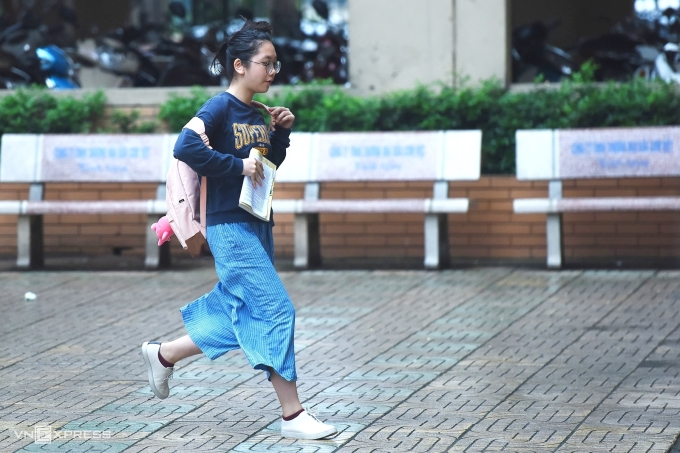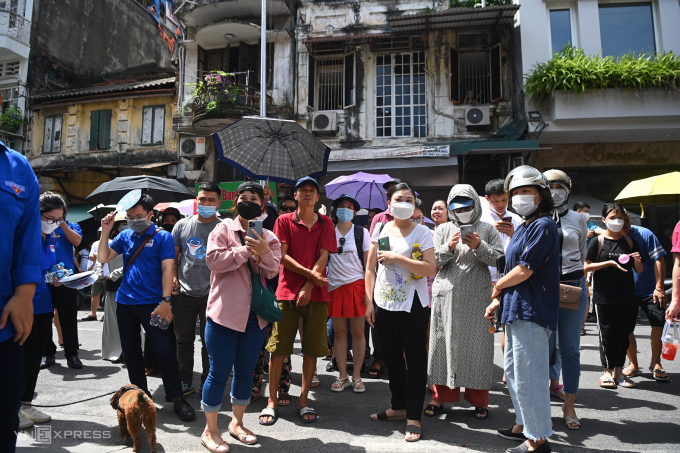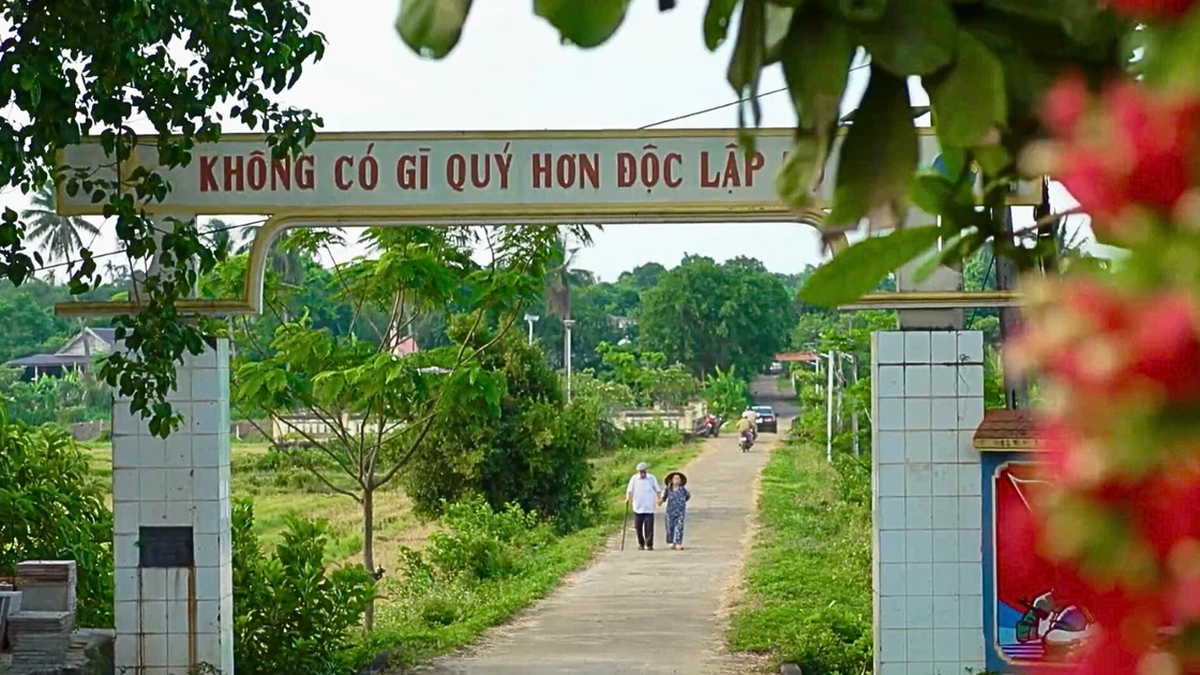Hanoi Hoang Linh studies at school in the morning and afternoon, then goes to the center to study until 10pm, comes home to study past midnight, and is also busy on weekends.
Linh is a student at Yen Hoa Secondary School in Cau Giay District. In three weeks, she will take the entrance exam to Quang Trung High School - Dong Da. The school's average standard score last year was 7.7. Her academic ability is about 7 points per subject, so Linh is very worried.
The house is one kilometer from school. In the morning, the girl walks or calls a motorbike taxi. Her father picks her up at noon. Linh said that luckily her house is close by, so she can go home and take a 30-minute nap. Many of her classmates have finished lunch and go to school.
Linh returns to school in the early afternoon. After school ends at 5 p.m., Linh is taken by her mother to the exam preparation center, 5 km away. On days when teachers correct the questions and school ends late, Linh does not get home until nearly 11 p.m. Due to the large amount of homework, the female student studies by herself for an extra 1-2 hours, sometimes going to bed at 2 a.m. On average, Linh studies about 13 hours a day, some days more.
The female student said she often eats dinner while waiting for her mother to pick her up, mostly bread, fried sausages, and sticky rice bought right at the school gate. On days when she is tired or has no appetite, Linh only drinks Milo with tapioca pearls - a favorite drink of her and many of her friends. If school ends late, or her mother is late to pick her up, Linh eats right on the motorbike seat. Weighing only 37 kg, with a thin, small body, many people were skeptical when she said she was a 9th grader. This time, her eating habits were irregular, and Linh lost another 2 kg.
"I'm stressed and tired but I still have to study. The exam is coming soon. I'm trying to increase my score by 1 point in each subject so that I can pass," Linh said.
Hoang Nam, from Thanh Tri district, is equally busy. In addition to two sessions at school, Nam studies extra every night, and his schedule is also full on weekends. Nam's first choice is Ngo Thi Nham High School, his second choice is Nguyen Quoc Trinh School with average scores last year of 6.85 and 6.25 for each subject. After several practice tests, Nam scored about 7 points for each subject, but because he is still not confident, every night when he gets home at 9pm, he only dares to rest a little before sitting down to study.
Fearing that her son would not be in good health, Ms. Phuong, Nam's mother, did not let him ride his bike to class by himself like before. She assigned the father to take him and the mother to pick him up. Her husband had more free time, so he came home early in the afternoon to prepare Nam's meals so that he could make it to his evening class, which started at 6:30 p.m.
"When I study for the exam, the whole family is under pressure, as if they are taking the exam with me," said Ms. Phuong.
To secure a spot in public grade 10, Linh, Nam and tens of thousands of grade 9 students are racing against time to review. Although there are no specific statistics, it is very common for students to attend many extra classes, according to Ms. To Thi Hai Yen, principal of Giang Vo Secondary School.

A candidate taking the 10th grade entrance exam in Hanoi in 2019. He arrived late and rushed to the exam room, still holding a book in his hand. Photo: Giang Huy
Teachers and principals pointed out three main reasons leading to the situation of 9th grade students "skipping out to study" before the transfer exam.
One is the fierce competition to enter public 10th grade in Hanoi, according to Mr. Vu Khac Ngoc, a teacher at the Hoc Mai Education System. This year, nearly 105,000 candidates registered for the exam, while the total quota was about 70,000, so the average admission rate was 66.5%.
If we look at the inner city, the situation is more severe. 12 districts have nearly 45,000 students registered, with a total quota of 21,890, the passing rate is only 48%. Meanwhile, high schools in the suburbs enroll nearly 48,000 students out of a total of 60,000 registered, the passing rate is up to 80%.
The second reason is Hanoi's 10th grade admissions method. For many years, the city has been divided into 12 admission areas. Each student can register for a maximum of three choices, of which the first and second choices belong to the permanent residence area, and the third choice is random. Candidates who fail the first choice will be considered for the next choice, but must score 1-2 points higher than the standard score of that school.
"This is an outdated admission method, causing anxiety for students and their families, because they are afraid of failing all their wishes," said Mr. Ngoc.
The difference in environment and tuition fees between public and private schools is the third reason, according to a principal in Dong Da district. In the past two years, tuition fees for public high schools in Hanoi have been a maximum of VND109,000 per month. Next year, tuition fees will range from VND100,000 to VND300,000, hundreds of times lower than private schools.
Private schools often have many systems with different tuition fees, the lowest is about 4.5 million VND, the highest is 86 million VND per month, not including other costs such as boarding, uniforms, facilities. Meanwhile, the average income in 2021 of the capital's residents is 6 million VND per month, according to the General Statistics Office.
"The contribution level of private schools is beyond the means of most parents in Hanoi," said the principal. He also said that in addition to financial factors, a child who has studied in a public school from grades 1 to 9 will not easily integrate when transferring to a private school.
That makes parents and students apprehensive, thereby increasing expectations for public schools, he concluded.
Increased expectations lead to more studying, while sleep and eating time are not guaranteed, directly affecting the physical health of students. This is a clear and obvious impact, according to principal Dinh Thi Van Hong of Dong Da Secondary School. In addition, students being stressed for a long time also affects their psychology. Ms. Hong assessed that this is the worrying consequence, not seen immediately and unpredictable.
Ms. To Thi Hai Yen, Principal of Giang Vo Secondary School, advised students to spend time studying on their own. An important review strategy during the final stage is to use time wisely. Students should study early in the morning, avoid staying up late, and allocate time for rest and eating to restore their health.
Parents also need to have a backup plan. Ms. Yen assessed that many private schools and vocational colleges have good quality, families do not necessarily limit their choices to public schools.
However, these solutions are only the tip of the iceberg, according to Mr. Ngoc. According to this teacher, Hanoi should adjust the admission principles, learning from the current university admission model: allowing students to register without limits and not distinguishing between the standard scores of their preferences. This approach is progressive and much less stressful.

Parents in Hanoi wait for their children after the Literature exam for grade 10, June 2022. Photo: Giang Huy
Ms. Phuong feels heartbroken every time she sees her son exhausted and unable to finish his homework, but she still hopes that he will pass the public school entrance exam because the environment is "healthier".
"If my child were poor, I would have sent him to private school. But he is a pretty good student and is struggling, so both his parents and he want to try," she said.
Ngoc Linh also knew that her parents had planned a backup plan for her to enter Luong Van Can High School - a private school near home, but the female student did not reduce her study intensity.
"I understand my family's circumstances. If I go to a private school, my parents will be under financial pressure, so it's better to get into a public school. I also want to do my best so that I won't regret it when I receive the results," Linh said.
Thanh Hang - Binh Minh
*Student and parent names have been changed
Source link



































































































Comment (0)